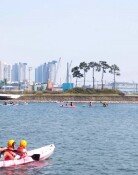Markets Remain Calm Despite Nuclear Threats
Markets Remain Calm Despite Nuclear Threats
Posted February. 11, 2005 22:52,
Despite expectations that North Koreas claim of already possessing nuclear arms would have had serious consequences on stock prices and exchange rates, stock and foreign exchange markets remained undisturbed.
Analysts assume that the placid condition of the markets is due to the fact that they have already developed resistance to the Norths nuclear threats and that there is a common understanding that its recent claim is part of its strategy for a better position in its upcoming negotiations with the U.S.
However, North Koreas potential failure in using its claim as an effective tool in negotiations and its potential strained relationship with the U.S. and Japan would have a negative influence on the Korean economy.
Stock Market Remains Undisturbed-
On February 11, the KOSPI declined by 1.96 points (0.21 percent) from the last trading day (February 7). It went below the 940 mark once, yet stopped short of inching down further as foreigners bought about 100 billion won worth of stocks. The amount of their purchase of shares, on that day, exceeded that of sales.
The KOSDAQ index rose 5.48 points (1.14 percent), implying that it was not affected by North Koreas nuclear issue nearly at all.
Research Center Head Lee Jong-woo from Hanwha Securities explained, It appears that the markets have already developed resistance to the North Korean nuclear problems as they have not been resolved for over two years.
Interest Rates and Exchange Rates are Also Resistant to the Norths Nuclear Threats-
On February 11, the exchange rate closed at 1033.20 won against the dollar, 7.0 won up from February 7, the last trading day.
Byun Myeong-kwan, manager of the funds market department at Cho Hung Bank analyzed, Though emotional uncertainties due to the North Korean regimes nuclear threat have partly resulted in a fall in the value of the Korean won, the sharply increased exchange rate of the yen and dollar during the New Year holidays are more largely responsible.
Interest rates of three-year national bonds have surged to an annual 4.46 percent, the highest figure since May 4 of last year (4.49 percent), as worries arise that the Monetary Policy Committee will freeze the overnight interest rates in its meeting on February 15, weakening investment sentiments.
Head of Mirae Asset Kim Kyeong-rok said, Presently, there is no sign in sight that North Koreas nuclear issues will have such serious consequences on the bond market that bond prices will increase greatly, although how the issues develop may affect the market.
Problems Lie Ahead-
The dominant views are that the currently placid condition of the financial markets does not necessarily mean that North Koreas nuclear threats are gone forever.
Hwang Jang-joong, investment strategy team leader at LG Investment and Securities warned, There is a strong need to closely follow the developments of the nuclear issues, now that they are not resolved completely.
Financial circles are keen to see what impacts the Norths declaration will have on inter-Korean economic cooperation and local economic recovery efforts.
An employee from Hyundai Asan said, This incident will not create much stir, as our business with the North is distanced from politics and diplomatic affairs, as shown in the continued tour to the Geumgang Mountains even during the exchange of fire in the western sea in 2002, adding, Still, we are closely following the developments of the issue.
Economy-related ministries including the Ministry of Finance and Economy are warily working to find potential effects the Norths declaration of possession of nuclear arms will have on the international financial markets.
International Finance Department Head Yoon Yeo-gwon from the Ministry of Finance and Economy stated, We have been carefully watching the condition of the international financial markets since the Norths announcement that it has nuclear programs, but there are no clear bad signs yet, and added, Additional interest rates of the Korean foreign exchange stabilization bonds in the Singaporean market on February 11 showed a stable condition, between 0.75 and 0.76 percent, following a similar trend in the New York market the day before.







